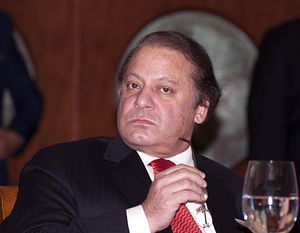Last week, Chinese President Xi Jinping visited Pakistan to a warm welcome. He left having signed scores of agreements that commit, over several years, billions in Chinese financing and support for various Pakistani infrastructure projects. Beset with a range of problems, Pakistan lacks the indigenous capacity to invest adequately in its own power and infrastructure needs, despite facing major shortfalls in these areas. China and Pakistan enjoy a special relationship by their own admission: they refer to their partnership as an “all weather” one and Xi, prior to arriving in Islamabad, remarked that he felt as if he was “going to visit the home of [his] own brother.”
Still, despite the warm rhetoric toward China and years of positive ties between the two countries, when it came to backing Pakistan, both financially and politically, Islamabad had always found support flowing in from the Arabian peninsula to its west. Arab states, most notably Saudi Arabia, have long supported Pakistan at times when it found itself isolated by the international community. Pakistan, in turn, maintains close ties with the Arab world. With Saudi Arabia in particular, Pakistan enjoys a close security relationship. From the early Cold War years through the 1990s, Pakistani military assistance was somewhat taken for granted by Saudi Arabia. Last year, Riyadh gave Pakistan $1.5 billion in an “unconditional grant” to shore up its foreign exchange reserve to service its debts. Additionally, after Prime Minister Nawaz Sharif was ousted in a coup in 1999, Riyadh hosted him during his years of exile.
It was Sharif who oversaw Xi’s visit to Pakistan last week, and it was Sharif who complied with the Pakistani parliament’s decision to stay out of Saudi Arabia’s “Operation Decisive Storm” — an air campaign launched in late March against the Houthi rebels in Yemen, led by Saudi Arabia with a coalition of Arab states and the United States backing it. Pakistan’s decision to stay out of the conflict stunned observers on the Arabian peninsula. Anwar Gargash, the United Arab Emirates’ minister of state for foreign affairs, condemned what he saw as Pakistan’s “contradictory and dangerous” move.
Of course, Pakistani policymakers had to have been aware of potential blowback. Maintaining neutrality on the Yemen issue is a major move for Islamabad and one that will surely cause the Saudis and other Arab states flush with cash to reconsider their financial commitments to Islamabad in the future. Fortunately, with the commitments Beijing set out last week, this might now be less of an issue for Pakistan.
A report published Monday in Pakistan’s Express Tribune makes the case that the impending Chinese financing buoyed Islamabad’s conviction in standing neutral while the Saudi-led coalition bombed Yemen. The billions in investment announced during Xi’s visit overshot what any of Pakistan’s Arab allies could offer. Certainly, it is preferable for China if its ally and beneficiary stays away from foreign entanglements when it faces a major security threat at home from extremist groups. Shortly after Xi’s departure, Pakistan announced that it would create a security force comprising nine army battalions and six wings into civilian security forces to protect Chinese workers in the country. Islamabad appeared to be doubling down its commitment to China over its Arab benefactors.
As The Diplomat recently reported, the reason Xi’s trip to Pakistan was announced at the eleventh hour after being delayed beyond its original late-March time line was due to Saudi Arabia’s decision to launch Operation Decisive Storm. Xi was originally slated to also visit the Middle East, reportedly including stops in Cairo and Riyadh, in a single trip. Had Islamabad chosen to participate in Saudi Arabia’s campaign, Xi’s visit could have been delayed further. Additionally, as Mu Chunshan wrote last week, Chinese financing for the Iran-Pakistan pipeline entailed that Pakistan couldn’t stand shoulder-to-shoulder with Saudi Arabia in what was widely seen as a proxy conflict between Shia Iran and Sunni Saudi Arabia (Pakistan itself is a Sunni majority state).
Pakistan acquiesced to these Chinese concerns. In return, Xi reportedly told Sharif, in the words of the Express Tribune, that China “would stand behind Islamabad in the event of unraveling of its ties with the Arab world.” The report adds:
The Chinese leader even suggested Pakistan realized its true potential and pointed out that if Islamabad maintained unity in their ranks and implemented the China-Pakistan Economic Corridor project, then it would not have to look up to outside help either from the West or Arab countries.
To be sure, Pakistan hasn’t left Arab states behind altogether — at least not yet. It remains to be seen if the fallout from Pakistan’s neutrality over Yemen will affect the broader relationship between Islamabad and Riyadh. Additionally, there is reason to view last week’s agreements between China and Pakistan with some skepticism. Despite optimistic headlines touting amounts in the billions, there is a considerable gap between what China has promised Pakistan in the past and what it has actually delivered. One study found that just six percent of what China promised Pakistan in terms of aid, assistance, and investment between 2001 and 2011 was delivered ($66 billion was pledged in total). Things may be different this time, given Xi Jinping’s personal interest in developing Pakistan as the linchpin of his One Belt, One Road initiative, but China’s track record in Pakistan leaves much to be desired.
Pakistan’s decisions over the past month could spark a longer-term recalibration in Riyadh and other Arab capitals. Despite what Saudi Arabia may have told Islamabad, its financial backing over the years was far from “unconditional” for Pakistan. It was a down payment for Pakistani support for Saudi policies in the region — the money came with a heap of strings attached. After saying no to Saudi Arabia, Pakistan will have to look to China to keep it afloat. Time will tell if Beijing can hold up its end of the “all-weather” partnership and deliver on what it has promised.

































